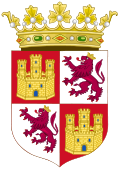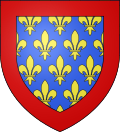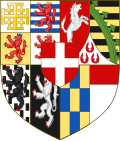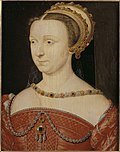Top Qs
Timeline
Chat
Perspective
Duke of Nemours
Title in the Peerage of France From Wikipedia, the free encyclopedia
Remove ads
Duke of Nemours was a title in the Peerage of France. The name refers to Nemours in the Île-de-France region of north-central France.
History
Summarize
Perspective
In the 12th and 13th centuries, the Lordship of Nemours, in the Gâtinais, France, was a possession of the house of Villebéon, a member of which, Gautier, was marshal of France in the middle of the 13th century. The lordship was sold to King Philip III of France in 1274 and 1276 by Jean and Philippe de Nemours. It was then made a county and given in 1364 to Jean III de Grailly, captal de Buch.
In 1404, Charles VI of France gave it to Charles III of Navarre and elevated it into a duchy in the peerage of France, in exchange to his ancestral county of Évreux in Normandy.
After being confiscated and restored several times, the duchy reverted to the French crown in 1504, after the extinction of the house of Armagnac-Pardiac. In 1507, it was given by Louis XII of France to his nephew, Gaston de Foix, who was killed at the Battle of Ravenna in 1512.
The duchy then returned to the royal domain and was detached from it successively for Giuliano de Medici and his wife Philiberta of Savoy in 1515, for Louise of Savoy in 1524, and for Philip of Savoy, Count of Genevois, in 1528. The descendants of Philip of Savoy held the duchy until its sale to Louis XIV of France.
In 1672, Louis XIV gave it to his brother Philippe de France, Duke of Orléans, whose descendants held it until the French Revolution. It was one of the many subsidiary titles held by the House of Orléans. The title of Duke of Nemours was afterwards given to Louis Charles d'Orléans, the second son of King Louis Philippe of the French.[1]
Remove ads
List of lords
- House of Château-Landon
- Orson (1120–1148)
- Aveline (1148–1174), died 1196
Aveline married Walter of Villebéon, lord of Beaumont-du-Gâtinais, in 1150 and shared the lordship with him. They left it to their son in 1174.
- House of Villebéon
- Walter I [Gautier I] (1150–1174), died 1205
- Philip I [Philippe I] (1174–1191)
- Walter II [Gautier II] (1191–1222)
- Philip II [Philippe II] (1222–1255)
- Walter III [Gautier III] (1255–1270)
- Philip III [Philippe III] (1270–1274)
The lordship was sold to the king in 1274.
Remove ads
List of dukes
Summarize
Perspective
House of Évreux (1404–1504)
- Charles d'Évreux (1361–1425), also King Charles III of Navarre
After the death of Charles III in 1425, the Duchy was claimed by the descendants of both his younger daughter, Beatrice, and his elder daughter and heiress, Blanche I of Navarre. Louis XI settled the claim on Jacques d'Armagnac, grandson of Beatrice, in 1462, though Blanche's descendants, the Kings of Navarre, claimed the title until 1571.
- Éléonore de Bourbon (1425–c.1462)
- Jacques d'Armagnac (1462–1477)
- confiscated from Jacques at his execution for treason in 1477, restored to his son Jean in 1484
- Jean d'Armagnac (1484–1500)
- Louis d'Armagnac (1500–1503)
- Marguerite d'Armagnac (1503)
- Charlotte d'Armagnac (1503–1504)
- The last descendant of Béatrix d'Évreux, she died without issue.
House of Foix (1507–1512)
- Gaston of Foix (1507–1512)
House of Medici (1515–1524)
- Giuliano de' Medici (1515–1516), married to:
- Philiberte of Savoy (1516–1524)
House of Savoy (1524–1672)
- Louise of Savoy (1524–1531), Duchess of Angoulême, Francis I of France's mother.
She received the duchy of Nemours in 1524 with the duchy of Anjou. It was later transferred to her half-brother in 1528 and she received the duchy of Touraine in exchange.[2][3] She also received later the Duchy of Auvergne.
- Philippe of Savoy (1528–1533)
- Jacques of Savoy (1531–1585)
- Charles Emmanuel of Savoy (1567–1595)
- Henri I of Savoy (1572–1632)
- Louis I of Savoy (1615–1641)
- Charles Amadeus of Savoy (1624–1652)
- Henri II of Savoy (1625–1659)
House of Orléans (1672–1848)
- Philippe de France (1640–1701)
- Philippe d'Orléans (1674–1723), Regent of France 1715–1723, son of the above
- Louis d'Orléans, Duke of Orléans (1703–1752), son of the above
- Louis Philippe d'Orléans (1725–1785), son of the above
- Philippe d'Orléans, Philippe Égalité (1747–1793), son of the above
- Louis Philippe d'Orléans (1773–1850), King of the French, 1830–1848, son of the above
Titular Dukes of the House of Orléans
- Louis Charles d'Orléans (1850–1896), son of the above
- Charles Philippe d'Orléans (1905–1970), great-grandson of the above
Potential claimants of the House of Orléans-Braganza
In 1909, members of the House of Orléans and the House of Orléans-Braganza signed the Pact of Brussels (also known as the Declaration of Brussels), the Duke of Orléans being present. The dynastic pact created the title of Prince of Orléans-Braganza for the Count d'Eu and his descendants, thus maintaining the princely status of his house, although this is considered a house distinct from the Royal House of France, and the Count d'Eu did not in fact recover his former position in the line of Orleans succession to the French throne.[4]
Under the Pact of Brussels the Count d'Eu and his sons equally undertook in his name and the name of his descendants not to contest in any way to the branch of the Duke d'Alençon the possession of the title of Duke of Nemours.[5][6]
Nevertheless, Charles Philippe d'Orléans, the last Duke of Nemours and only descendant of the Alençon, died without heirs. His death opened the theoretical possibility for the Head of the House of Orléans-Braganza to claim said title without violating the family pact.
Remove ads
List of duchesses
Summarize
Perspective
This is a list of duchesses of Nemours and their original houses.
House of Évreux
House of Medici
House of Savoy
House of Orléans
Remove ads
References
Wikiwand - on
Seamless Wikipedia browsing. On steroids.
Remove ads















